 Your new post is loading...
 Your new post is loading...
Sometimes you do everything right, and it works like it should. Other times you do everything right, but nothing happens. But here’s the good news.If your rankings are stuck, there are things you can do to help them move up in the SERPs. It’s absolutely possible. Today, I’m going to show you exactly what to do to get your rankings up....
The annual Imperva Incapsula Bot Traffic Report, now in its fifth year, is an ongoing statistical study of the bot traffic landscape. For our latest report we examined 16.7+ billion visits to 100,000 randomly-selected domains on the Incapsula network to tackle the following questions: - How much website traffic is generated by bots?
- How are bad bots used in cyberattacks?
- What drives good bot visits to various websites and services?
- Which are the most active bad and good bots?
The answers to these questions are found in the infographic below. In the accompanying commentary we take a closer look at some of the macro trends, as reflected in the activity of the most active bot archetypes.
We didn’t realize it when we started this research, but we were about to uncover a specific speed factor that Google uses to rank your website. It’s not just speed alone that matters, but a specific type of page speed that makes the real difference. The study you’re about to read is the largest study of the impact of website speed on Google search ranking ever performed. Ahrefs contributed ranking data, but it took massive amounts of crawling, collating, and crunching the data on our part to get accurate results. We surfaced several highly significant findings. These findings are significant, partly because they’ve never been revealed before, but also because they could make a massive impact on your website’s ranking!...
Let me start with a basic statement. Keywords aren’t that important anymore.
How can I be so sure about this? Because the data tells me so. First, let’s look at an example.
In a recent study, we cracked the Hummingbird algorithm code wide open. We analyzed 9.93 million words of content, smashed them together, shook them up and came up some astonishing results. Our focus was to understand exactly how Hummingbird works and how it ranks websites based on their content.
Our study analyzed select sites within a narrow niche and discovered how they ranked comparatively in select topics.
The top-ranked blogs did not necessarily have high keyword saturation, keyword representation or lots of high-DA backlinks.
What did the top ranked blogs have, if not keywords or backlinks?
They had strong topic coverage, few gaps in the topics that they covered and comprehensive content within each of their chosen topic categories.
In other words, they had really strong content, instead of a really strong link profile....
One such significant trend that might govern the future of SEO is:
Voice queries on mobile…
The chronically expanded use of smartphones and the arrival of personal assistants has led to their prominence.
Voice queries are like a two-way conversation and they aim to help the user complete tasks from their life in real-time, like booking tickets and making a purchase.
Rather than links, users want direct answers, when they perform a voice search. So, such queries are inherently different from the typical keyword search in the search box....
New to SEO? Here’s all the tips you need to know to optimize your content before, after, and when you blog.
Via massimo facchinetti
The advancement of SEO has been influenced by a number of different things, from social media to content marketing. In fact, it’s as if all marketing practices mixed together yield great SEO.
When you have a collection of best practices, you can learn a lot from the older practices that led to this point. The same is true with SEO.SEO isn’t just a modern practice. You can learn a lot about it from the histories of advertising, copywriting, word-of-mouth, print marketing – even old school press relations. Here are a few lessons today’s SEOs can learn from the PR execs of old....
While Google keeps us on our toes with all the algorithm updates they keep rollin' out, one thing has stayed pretty consistent for inbound marketers looking to optimize their websites for search: keyword research.
Well, the need to do keyword research has stayed the same. How you actually do it hasn't.
So I'm going to lay out a keyword research process you can follow to help you come up with and narrow down a list of terms you should be targeting.That way, you'll be able to establish and execute a strong keyword strategy that helps you get found for the search terms you actually care about.
Google says it has updated its Trends Reports so that different search terms meaning the same thing will be measured accordingly:
So, when you measure interest in “Gwyneth Paltrow (actress)” our algorithms count many other searches that mean the same thing “Gweneth Paltrow,” “Gwen Paltro,” etc. As our systems improve, we may even count searches like “Lead actress in Iron Man.”
As a beta feature, Google claims the new Trends Reports include data for 700,000 unique topics, with the ability to measure the search interest data worldwide or in Brazil, France, Germany, India, Italy, UK and the US, with more topics and regions to come...
OAO is the collection of techniques that online content publishers use to rise above the pack of sales sites, catalog sites, or sites that live through shady SEO practices, generating cheap clicks that cause unwary web surfers to stumble upon their pages.
OAO allows online publishers to leverage their greatest assets—their wealth of high-quality content—to create a consistent web-wide presence, and generate consistent new and repeat visitors. OAO uses the best practices of SEO, along with social media, content sharing, engagement mechanics and branding, to build and optimize loyal and targeted audiences for online content publishers.
OAO is an emerging discipline, but savvy publishers can begin to put its elements in place in their online strategies right away. Here are some tips to get you started...
Sites that have a high number of social shares, comments, tweets and +1s tend to rank better in Google, according to a new report from Searchmetrics....
What you should spend most your time on when working on your web marketing strategy based on average return on investment (ROI). Hint: It's NOT Social Media...
So how do you decide which web marketing strategy to work on to attain the most fruitful retail website possible? The sexy new trend is social media marketing, so that means you should do that, right?
WRONG!
In this eMarketer article (and the graph above), the complicated decision of “what do I do?” is made easy and backed by real data.It’s crystal clear. You need to work on getting traffic to your website through the search engines. Google, Yahoo, and Bing are the #1 referral traffic source for retail websites (35%). Social media ranks fifth out of six (2.4%)! You definitely want a piece of that pie. Here’s how…
This is partly because Google’s algorithm isn’t playing any games these days, and partly because there are so many businesses working on their local SEO at the same time you are. If these people are your competition it’s going to be more and more difficult to rank as time goes by. Despite all of this, there are still businesses out there that aren’t embracing the essential nature of local SEO. Some are trying to keep things on a purely social playing field by purchasing ads on Facebook and focusing their marketing efforts exclusively in these areas. Others are (seemingly) deliberately ignoring the opportunity presented by the local listing pages offered by the major search engines – Google, Bing, and Yahoo each offer pages that businesses can claim in order to increase their local exposure. And if the search engine has a result to deliver that was created with their webmaster tools, don’t you think it’s more likely than someone other content to appear when someone searches for a term relevant to your business?...
|
From these chaotic beginnings, search engine optimization matured and evolved as search engines became more sophisticated to screen out this kind of overt manipulation. Google makes at least 600 changes to its algorithms each year in an attempt to surface and prioritize the most useful information.
And yet the last few years of content marketing have had a similar dynamic at times. Some content gets published purely for search engine optimization. When every content marketer follows the same SEO checklists, all content can start to look the same.
It will be interesting to see the impact of the latest search engine advance. In 2015, Google announced RankBrain, an algorithm learning AI system, that is designed to think more like a human in ranking sites. It’s already the third top ranking signal....
To write smart copy that attracts more eyeballs, find more keywords related to your topic. Here are eight tools to help. “Write for the user, not the search engines,” continues to be a mantra of content marketing. In reality, smart content creators write for both. Quality content is interesting, informative, original, AND it includes keywords, ultimately leading to more visits and helping you achieve your why. Quality content naturally builds links, which improves the site authority, which in turn boosts rankings, and gets more eyeballs on your content. Integrating SEO with your content is the first step. But to really write smart copy, you should look at terms related to what you are targeting and how Google associates those terms. Then incorporate those terms into your content. Or you can use those findings to identify related topics you may want to write about down the road....
Not to sound like a sleazy used-car salesman or an obnoxious motivational speaker, but there’s definitely a recipe for crushing it with your keywords. During the years, I’ve experimented with nearly everything under the sun and have come up with a surefire formula for dominating the SEO game by targeting the right keyword and tailoring your campaign to reach your audience. Here’s how to do it step by step....
If desktop search is the first trillion, and mobile search is the second trillion, where will we find the third trillion?
Well, for a start, there is some growth still to come even in searches like those that people are already doing even in the most mature markets - the best argument I have for that is this chart which shows the growth of e-commerce, and how all of Amazon’s growth fits into around 8% of the total retail market. Just as e-commerce has further to go, so there is still untapped search demand.
But that’s going to be slow going - it’s not going to add a trillion / year any time soon.
So what might?
Well, my theory is that it’s going to come from searches people aren’t doing yet.
Here’s some data and evidence...
Last week Google made a number of major announcements. There’s nothing unusual about that, of course, except this time the announcements have big implications for SEO, which will make thousands of businesses around the world wary about their efforts to scale SERPs.
This time around, Google has publicly discussed two new updates which offer a major shake-up to the standard Penguin or Panda upgrade. One is a new algorithm called RankBrain, which boasts machine learning capabilities, and the other is a slightly disconcerting real-time Penguin update. For the latter, it essentially means it’s time for businesses to be at the peak of their game with their SEO practices.
When not frightening businesses with a continuous SEO ranking update, Google is nearing completion of an extraordinary project which would bring the Internet to over 100 million people around Indonesia. For businesses, however, the big news is Google’s latest updates–here’s what’s known so far....
The majority of brands that researched and targeted long-tail search terms have experienced a leap in organic traffic and rankings, but that doesn’t mean you won’t experience challenges.
Truth be told, if you want an immediate organic traffic boost, creating content around long-tail search phrases may not yield those results.
But your focus should be on the long-term. That’s when your web pages start showing up in results, even for keywords you didn’t primarily target.
If you’re willing to play the long game, long-tail keywords can increase your organic traffic and convert better than head terms....
It’s a no-brainer then that besides writing “epic” content, and following the rules of “engagement” online, you must optimize your WordPress blog (you’re using WordPress as your CMS, arent’ you?) to rank well in search engines. Why?
Thousands, maybe hundreds of thousands of relevant visitors that might find your content incredibly useful would be lost.In this post, I walk you through some simple yet key steps tooptimize your blog for search engines so you can attract more traffic to your website, and keep it....
Hashtags are inherent part of Twitter communication and a way of highlighting topics in tweets. They can also help in getting more attention from users. The popularity of specific hashtags reflects interests of followers. Because every profile has its own group of unique followers, there is no universal hashtag that evaeryone could use and win.
There are various strategies and principles that can be applied to maximize the effects of using hashtags. To inspire you, we looked through several cases of using brands’ own and trending hashtags. Check what we discovered....
Are the right technical pieces in place? Are you producing the right content? Are you connecting with customers, colleagues, and other industry thought leaders? These are the hallmarks of a good SEO program today.
Before you start thinking it’s all too difficult, it’s really not.There are some quick SEO wins you can achieve to take steps toward higher rankings. Here are nine of them you can probably do just by setting aside an hour here or there.
Thanks to recent Google changes, search engine optimization isn't nearly as powerful as it used to be. But that's OK--there's a better way.
If you've ever tried to deal with search engine optimization, you most likely have, at some point or another, wanted to bundle your whole site up and toss it into the nearest virtual trash can. Particularly if you felt compelled to focus on keywords, or any other technique calculated to artificially pique someone's mouse clicks.
You should be delighted to hear then, if you haven't heard yet, that the old-fashioned concept of SEO is deader than last week's sandwich. Google pretty much pounded the crap out of keyword stuffing and other absurdities with the search algorithm changes it's made over the last couple of years. And then Google made search secure, which means you can't even see what keywords someone used to get to your site.
It's about time, because all the minutiae blinded entrepreneurs to what is really important: making a connection with an audience. The term--not exactly new--that seems to be displacing SEO is OAO, online audience optimization. Before getting too squirrelly about another Three Letter Acronym, let's get grounded and think about what's important....
In the latest of our posts looking at how major brands use the four main social networks I’ve decided to turn the spotlight on Pepsi.
The drinks brand is forced to play second fiddle to Coca-Cola’s global dominance, and is unlikely to ever match its rival’s huge social following.
However it should still make an interesting case study, particularly with its long list of brand ambassadors. This post follows on from similar blogs looking at brands such as McDonald’s, Nike, Burberry and Walmart.So without further ado, here is a quick overview of how Pepsi use Facebook, Twitter, Pinterest and Google+...
Fast changing trends and serious competition has digital marketers chasing the latest and greatest tactics like hamsters on exercise wheels.... ... All the scrambling often means core skills are overlooked. In fact, one of the easiest things a company can do to improve online marketing performance is to stop sucking at the basics. When it comes to optimizing for search and social media, well implemented basics are as good for search engines and social networks as they are for your customer’s user experience. Here are a 8 fundamentals worth applying to your organization’s daily content creation, amplification and optimization process....
|



 Your new post is loading...
Your new post is loading...



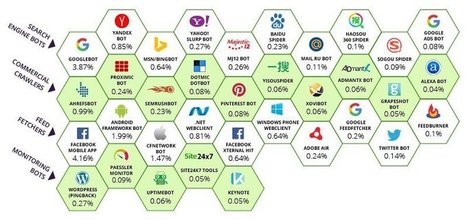






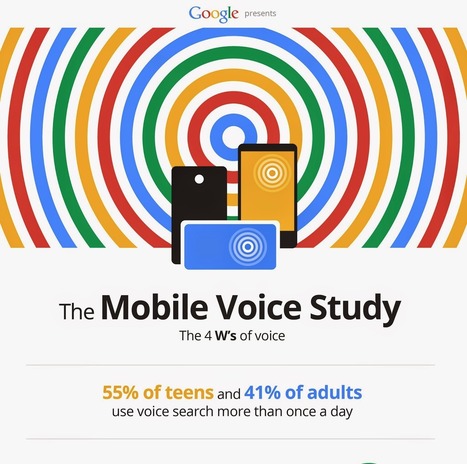
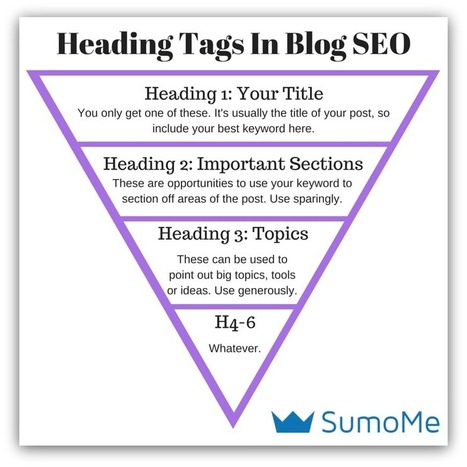

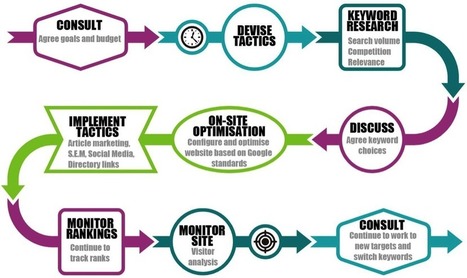




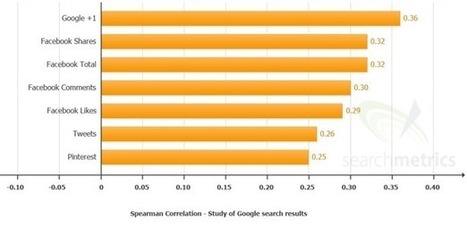





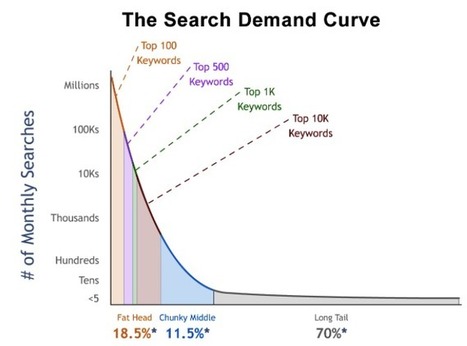


















Neil Patel shares practical SEO tips to get your site ranking better on search engines.